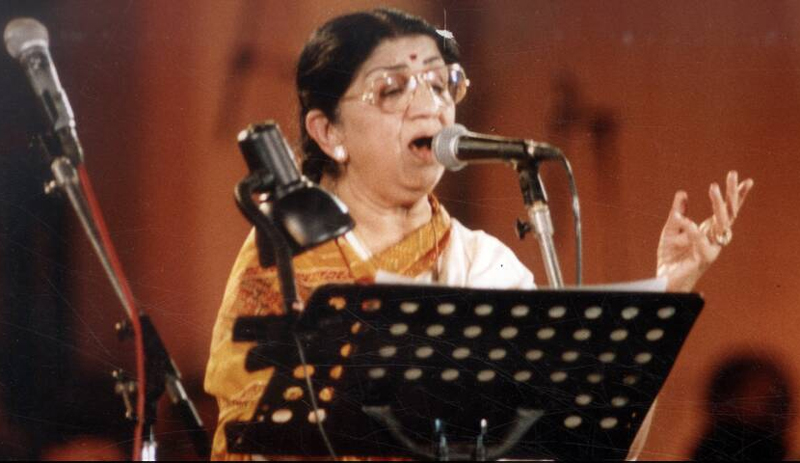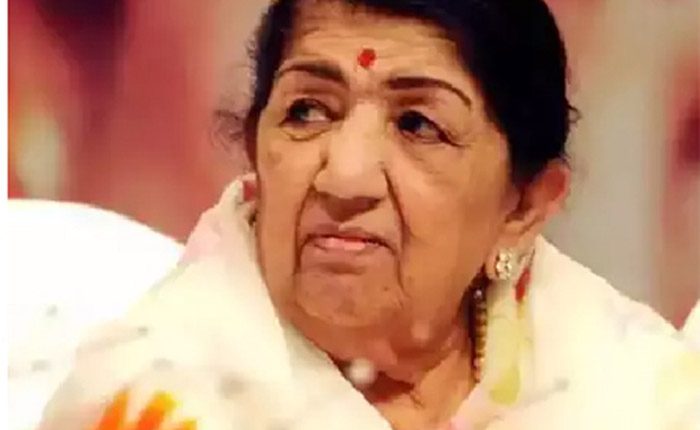Bibhuti Pati
A VOICE THAT WILL BE
A voice which is only one in the world
A voice for which there is no match whatever
Has already become a tale eternal
Rest for the tired, solace for the suffering
Tickling us and cackling
Singing and dancing with us
In our moments of joy
Rising up high to the sky sometimes
Sometimes going down low to the nether world
Casting a spell on entire universe
Taking us all in its embrace
Sinking soft into our heart
The melody that ends all bitterness
Gives peace to a man running
A lullaby sometime, sometimes it would not let us sleep
Diving deep into the vortex of love
Enticing the passers by
Intoxicating, bathing us in Ganges of love
Waking up the sleeping buds
A thirst that remains unquenched
Opening closed doors
A voice that envelops, over whelms
With me for sixty years wherever and everywhere
Riding the winds, echoing over the sea and the sky
I hear it ringing
For over six thousand years,
A hundred generations
A ‘Bharat Ratna’, a pearl for the world
A voice that is ageless, eternal fresh
Ever fragrant like fresh flowers
Pervading every speck, everywhere
A voice that is called Lata Mangeskar!
Whoever is fated to come will come, but now the one who was to come will never come, all is still and quiet and finally the music and melody have silent! How long the music will suffer without your voice and support? Tears fall from our eyes like torrential rain with a hope that our lovable melody queen will come; it is only an unfinished hope of waiting! Come and see the music era, what they are like without you. The eyes are look lost, sad and wet with crying and tears roll down like the melodies flow from your tone.
A voice which has been ringing in our ears for years now, the voice which lightens of the mood and removes the sadness however much intense they might be. The voice which soothes like a balm transforms the weather and make it fresh and a new as if one has woken up after refreshing sleep as if one laughs out aloud, as if one gets to sit next to a sweetheart or gets to meet an old classmate or like a child who is over joyed getting an unexpected result.
It is the voice which captured the imagination of thief, or a historian, or a soldier, or a tired and exhausted woodcutter, or a merchant, or a butcher, this voice has enthralled many weary travellers on their path.There is none who has not wowed or exclaimed a sense of joy, no one who has not been smitten or has not been soothed and becalmed by this voice. Be it a father, son or a grandfather, be it a mother, daughter or a grandmother. Be it a neighbour or an acquaintance or a spoilt brat or a dutiful son, a mansion or a dilapidated roof, acquired church, a grand temple or a mosque or be it a human, nobody has been left untouched and spell bound by the magic of this voice. That voice is Lata Mangeshkar’s. What a contrast is the present breed of performers the family of ‘Char Botal Vodka’- cacophony and loud music, and far away from it lays the endless ocean of Lata Mangeshkar’s melody.
Lata Mangeshkar has been an integral part of Indian musical journey. It has given immense joy to just listen to her songs.This rare specimen of humankind regaled music lovers of the world for over seven decades. Undoubtedly, she had a massive global appeal.
Ghulam Haider, a great musician and music director, was born in the walled city of Amritsar near the Golden Temple. This qualified musician has changed the face of film songs by combining popular ragas with the verve and rhythm of Indian music. This great man introduced the legendary Shamshad Begum, Noor Jehan, Mohammed Rafi and Surinder Kaur in films as singers. He shifted to Bombay in 1945 along with Noor Jehan, Shamshad Begum and his orchestra. He gave music for Humayun, Phool and many more films there.
In 1947, while Ghulam Haider was travelling in a train, he noticed a frail and small young girl singing gently, engrossed in her own world. The talent-hunter master was listening to a unique voice. He asked her if she would sing his tune. She sang it well. He was immensely impressed and called her to the studio where he was working. Her voice was considered feeble and not heroine material and rejected by S Mukherji, to whom the maestro had taken her.

However, she passed the tests given by Ghulam Haider. He persisted with her. The girl was Lata Mangeshkar. Haider gave her a first solo song ‘Dil mera torha’ in Majboor in 1947. He repeated her in his next film Aabshar. She never looked back thereafter.
One day, in a recording studio, Lata was rehearsing a Haider tune. Being raw, she kept repeating a mistake. Infuriated, the maestro gently slapped her. Everyone present was stunned. A member of the orchestra asked why he had slapped the girl. Instead of being repentant, he said, ‘I used to slap Noor Jehan also when she committed mistakes, and look where she is today. Believe me; Lata will lord over the world of music one day.’ How true were his words!
Retd. Brigadier Aditiya Madan says, “It was mid-June in 2001. We all well prepared for the border personnel meeting with the Chinese at the Chushul-Moldo sector. We all were very thrilled as this was the first time that we were to drive 5 km inside the Chinese territory to reach the venue on their side. The meeting was conducted in two parts, and meeting was followed by a short recreational programme before we were to move in for lunch organised by the hosts. To our surprise, the programme featured Chinese girls singing and dancing to the lilting hit songs of Lata Mangeshkar from 2000 and 2001. They danced superbly to ‘Humko humise chura lo’ (Mohabbatein) and songs of Kabhi Khushi Kabhie Gham. I finally got to meet the performers. They admitted that they were great fans of the versatile singer Lata Mangeshkar, the now immortal Nightingale of India”.
Generosity and being humane came naturally to this Nightingale of India. In 1987 there was a famine in Rajstan. An organisation Sur Sangam Sanstha organised a charity musical program for the benefit of the drought hit people. The organisation requested Lataji’s presence, which Lataji’s accepted without charging any fee. This is an unforgettable gesture by Lataji.Thursday was Lataji’s day of fasting and She didn’t use to sing on her fasting day and she never used to sing two songs continuously in any musical events. But for the same charity program
One after the other, so many songs of hers came to mind. Just listening to ‘Phaili hui hai sapno ki rahen’ from Dev Anand-starrer House No 44 transports me to another world. ‘Gujra hua zamana aata nahin dubara’ from Shirin Farhad. Which music lover hasn’t heard and appreciated ‘Lag ja gale se phir yeh haseen raat ho na ho’ composed by Madan Mohan, that prince of ghazals she was close to?
‘Yeh dil aur unki nighahon ke saye’ from the lesser-known Prem Parbat, a film whose prints are no more available, attests to composer Jaidev’s genius. Jaan Nisar Akhtar’s lyrics and Lata’s voice take the song to another level. And then there is ‘Kuchh dil ne kaha kuch bhi nahin’, that ethereal Anupama number set to tune by singer-composer Hemant Kumar.
Whenever any person listens to ‘Na jaane kyon hota hai yun zindagi ke saath’ from Basu Chatterjee’s Chhoti Si Baat on the radio, the person just forgets everything and spellbounds by Yogesh’s lyrics rendered so beautifully by the melody queen under Salil Chowdhury’s baton. One song that never fails to give goose bumps is ‘Baharo mera jeevan bhi sanwaron’ from Chetan Anand’s Aakhri Khat, one of the earliest films of Rajesh Khanna.
As a matter of principle, Lataji never sang risqué or lustful songs, but on producer-director Kamaal Amrohi’s insistence made an exception with ‘Jalta hai badan’ for period drama Razia Sultan. And what a composition it turned out to be by that master composer Khayyam! ‘Chithiye ni’, a Henna number set to tune by Ravindra Jain that film-maker Raj Kapoor had recorded before his death, always moves tears.
Lata Mangeshkar’s songs are bodily breathing antiquity, since they are deeply connected to all of our life stories and express a wide range of our emotions. “Time stands still, the stars are silent, and the world is at rest. Yet my heart is uneasy, suddenly I hear footsteps approaching, as though someone were walking through my heart, Or is it the sound of my heart quickening with hope?

There are many examples in which we see how Lataji’s singing enhances the impact of a scene. Think of Nargis miming ‘O mere laal aaja’ in Mother India or Meena Kumari in ‘Chalte chalte’ in Pakeezah, or Nutan in ‘Suno chhoti si gudiya ki lambi kahaani’ in Seema. The question of whether Lataji sings for the actress or the actress’s performance is dictated by Lataji is a fascinating one to ponder. She has become an icon in India and has crafted timeless music and melody that has become the soundtrack to our life.
Everyone’s beloved Lata didi (Sister Lataji) was the extraordinarily blessed by Goddess Saraswatee. A singer like Lata didi is created by the heavens once in centuries. Probably there will no one who could match up to Lata didi’s magic in the centuries to come. No doubt that this musical history of Lata didi can ever be rewritten.
Lataji’s two songs resonate in my mind and I hum it all the time “Zindegi Pyaar Ka Geet Hai… & Pyaar Kyaa Hota Hai Samajhaye koi”. Now I think if life is the music of love but what is the music of love, who will explain to us without you? I know the path you have walked on has an unknown destination and address and is usually a point of no return… But I still hope against hope, aimlessly that you will come back. From dawn to dusk and with the arrival of night I waited for you to sing again, even inspite of our desperate expectation the melody didn’t knock at our door or whispered in my ears. I keep humming your tunes but there is no movement in the soul’s music of love.
And today, as Lata Mangeshkar is no more with us, Roshan’s haunting melody from Mamata becomes all the more poignant. ‘Rahen na rahen hum, mehka karenge ban ke kali, ban ke saba, bag-e-wafa mein” (we may are may not be around but like buds’ our fragrances wafted like the morning breeze from our devoted garden.)May God provide this angel the highest pedestal in heaven! Long Live Lata.

